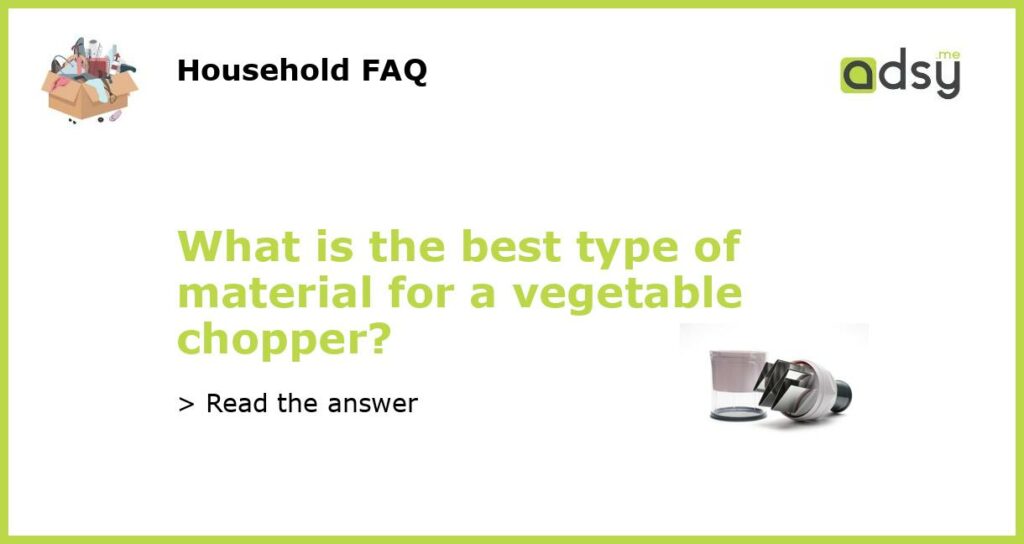Stainless Steel: The Top Choice for a Vegetable Chopper
When it comes to choosing the best material for a vegetable chopper, stainless steel stands out as the top choice. Stainless steel is known for its durability, corrosion resistance, and ease of cleaning, making it the ideal material for a kitchen tool that will be used frequently.
Stainless steel blades and components ensure that the vegetable chopper will last for a long time without losing its sharpness or becoming damaged. This is especially important when chopping tough vegetables like carrots or potatoes. Stainless steel is also resistant to staining, which means that it will retain its sleek appearance even after many uses.
In addition to its practical advantages, stainless steel is also a safe material to use in the kitchen. Unlike other materials, stainless steel does not react with acidic foods, ensuring that your chopped vegetables will not be contaminated with any harmful substances.
BPA-Free Plastic: A Safe and Affordable Option
While stainless steel is the top choice for a vegetable chopper, BPA-free plastic is also a popular option, particularly for those on a budget. BPA (bisphenol-A) is a chemical commonly found in plastics that has been linked to various health issues, making BPA-free plastic a safer alternative.
BPA-free plastic vegetable choppers are lightweight, making them easy to handle and store. They are also generally more affordable compared to stainless steel options. However, it is important to note that plastic can be less durable than stainless steel and may not last as long if used frequently.
When choosing a BPA-free plastic vegetable chopper, make sure to look for high-quality, food-grade plastic that is free from harmful chemicals. This will ensure that your chopped vegetables remain safe and free from any potential contamination.
Ceramic: A Delicate But Sharp Option
Ceramic is another material used in vegetable choppers, known for its sharpness and precision. Ceramic blades are extremely sharp and retain their sharpness for a long time, making them an excellent choice for precise chopping.
One advantage of ceramic blades is that they do not rust, making them particularly suitable for chopping fruits and vegetables with high acidity content. However, ceramic is a delicate material that can chip or break if mishandled. It is important to handle ceramic blades with care and store them in a safe place to avoid any damage.
While ceramic is a more delicate material compared to stainless steel or plastic, it can be a great option for those looking for precise and sharp chopping. However, it is important to keep in mind that ceramic vegetable choppers may require more careful handling and maintenance to ensure their longevity.
Combination of Materials: A Versatile Option
In some cases, vegetable choppers may be made from a combination of materials to maximize their functionality and durability. For example, a vegetable chopper may have stainless steel blades with a plastic or silicone handle for improved grip and comfort.
This combination of materials allows for a versatile and efficient vegetable chopper that combines the advantages of different materials. For example, stainless steel blades ensure durability and sharpness, while a plastic or silicone handle provides comfort and easy handling.
When choosing a vegetable chopper with a combination of materials, it is important to ensure that all components are of high quality and free from any harmful substances. Regular maintenance and cleaning of the vegetable chopper will also help prolong its lifespan and ensure optimal performance.
Personal Preference: Choosing the Right Material for You
Ultimately, the best type of material for a vegetable chopper depends on personal preference and individual needs. While stainless steel is generally considered the top choice due to its durability and safety, some might prefer the affordability and lightweight nature of BPA-free plastic.
If precision chopping is a priority, ceramic blades may be the preferred option. A combination of materials can offer a versatile and efficient vegetable chopper that combines the advantages of different materials.
Consider your specific needs, budget, and the frequency with which you plan to use the vegetable chopper. It may also be helpful to read reviews and compare different options before making a decision. By taking these factors into account, you can choose the best material for a vegetable chopper that suits your needs and ensures efficient and safe chopping.






